
#include <AstContainer.h>

Definition at line 120 of file AstContainer.h.
Public Member Functions | |
| std::list< VarBase > | getSubVariables (const tree< AstNode >::iterator &it) const |
| Get the list of all subvariable. | |
| Ast () | |
| Ast (const Ast &ast) | |
| Ast (const std::string &xmlFile) | |
| Ast & | operator= (const Ast &ast) |
| ~Ast () | |
| tree< AstNode > * | getTreePtr () |
| const tree< AstNode > * | getTreeConstPtr () const |
| std::map < std::string, BoxedFunction > | getBoxedFunctions () const |
| FunctionMapping | getMappedFunctions () const |
| std::list< std::string > | getVariableNames () const |
| Get names informations. | |
| std::list< std::string > | getFunctionNames () const |
| std::list< std::string > | getClassNames () const |
| Ast | skeleton () const |
| void | trace (const std::string &varName) const |
| void | apply (Obfuscator *obs) |
| StringBuffer | convert (Translation *obs) |
| MetricResult | compute (Metric *metric) const |
| void | printInfo (std::ostream &stream) const |
Protected Member Functions | |
| bool | is_skeleton_node (const tree< AstNode >::iterator &) const |
| void | fillAstInformation () |
| Scan the tree to fill the information about variables, functions etc. | |
| void | clearInfo () |
| Clear all information. | |
| std::string | getChildValue (tree< AstNode >::iterator parent, const std::string &nodeName="T_STRING") const |
| Going down one node, return the name of the value (may be function, class, variable, etc.). | |
| unsigned | nbNestedVariables (const tree< AstNode >::iterator &iter) const |
| Return the number of nested variables: the number of variable in the sub-tree. | |
| void | functionMapping (const tree< AstNode >::iterator &it, const std::string &fctName) |
| Get all the function names used in a function or method. | |
| void | functionBoxing (const tree< AstNode >::iterator &it, const std::string &fctName) |
| Box one function. | |
| void | sourceBoxing (const tree< AstNode >::iterator &it) |
| Source boxing. | |
| bool | detectAssignment (const tree< AstNode >::iterator &it) const |
| Detect if there is an assignment in the subtree. | |
| bool | detectFunction (const tree< AstNode >::iterator &i) const |
| Detect if there is a function declaration in the subtree. | |
| std::list< VarBase > | getRightVariables (const tree< AstNode >::iterator &it, const VarBase &left) |
| Must not be 'const' since it can write to the MapAssignements... | |
| VarBase | getLeftVariable (const tree< AstNode >::iterator &it) |
| Get the variable in the left of an assignment. | |
| VarBase | getSimpleVariable (const tree< AstNode >::iterator &iter) |
| Simply get the one variable with is on the subtree. | |
Protected Attributes | |
| tree< AstNode > | tr |
| Store the tree. | |
| tree< AstNode >::iterator | root |
| Iterator to the root of the tree. | |
| MapFunctions | functions |
| Function name to tree iterator. | |
| MapVariables | variables |
| Variable name to list of variable (VarBase) which depends on the context of the variable. | |
| MapClasses | classes |
| Class name to tree iterator. | |
| MapAssignments | assign |
| Relations within variables (contexted). | |
| MapVarEquivalent | equivalences |
| std::map < std::string, BoxedFunction > | boxedFunction |
| For one function, list of what function is used as input and what is used as output. | |
| FunctionMapping | fctmap |
| Function to list of function used in. | |
| Ast * | ref |
| Reference to another tree, used for in-skeleton transformation. | |
| BoxedFunction | boxedSource |
| Do a boxing of the current source code, this is helpful for non function based code (php,asp, etc.). | |
Private Member Functions | |
| void | walk (xmlNode *a_node, tree< AstNode >::iterator parent) |
| Walk into the XML tree in order to build the AST in-memory. | |
Friends | |
| std::ostream & | operator<< (std::ostream &stream, const Ast &ast) |
| void | exportXML (const Ast &ast, const std::string &xmlName) |
| Ast::Ast | ( | ) | [inline] |
| Ast::Ast | ( | const Ast & | ast | ) | [inline] |
| Ast::Ast | ( | const std::string & | xmlFile | ) |
| Ast::~Ast | ( | ) | [inline] |
Walk into the XML tree in order to build the AST in-memory.
Definition at line 698 of file AstContainer.cpp.
References tree< T, tree_node_allocator >::append_child(), getContent(), and tr.
00699 { 00700 xmlNode *cur_node = 0; 00701 tree<AstNode>::iterator iter = parent; 00702 for (cur_node = a_node; cur_node; cur_node = cur_node->next) 00703 { 00704 if (cur_node->type == XML_ELEMENT_NODE) { 00705 string name((char *)cur_node->name); 00706 iter = tr.append_child(parent,AstNode(name)); 00707 } 00708 else if (cur_node->type == XML_TEXT_NODE) { 00709 string content = getContent(cur_node); 00710 string name((char *)cur_node->name); 00711 if (content.length() > 0) { 00712 iter = tr.append_child(parent, AstNode(name, content)); 00713 } 00714 } 00715 walk(cur_node->children, iter); 00716 } 00717 }

Check whether the current node is a "skeleton node" or not A skeleton tree is a simplified one, derived from the AST
Definition at line 740 of file AstContainer.cpp.
References tree< T, tree_node_allocator >::parent(), utils::start_with(), and tr.
Referenced by skeleton().
00741 { 00742 string t = it->getType(); 00743 if (t == "T_INLINE_HTML") 00744 return false; 00745 else if (t == "text") { 00746 // look at the parent, if it's T_VARIABLE or T_STRING, keep it 00747 tree<AstNode>::iterator parent = tr.parent(it); 00748 string pt = parent->getType(); 00749 if (pt == "T_VARIABLE" || pt == "T_STRING" || pt == "T_CONSTANT_ENCAPSED_STRING") 00750 return true; 00751 return false; 00752 } 00753 else if ((t == "root" || t == "start" || t == "CHAR61" || t == "expr" || t == "top_statement_list" 00754 || t == "internal_functions_in_yacc" || t == "function_call" || t == "statement" || t == "unticked_statement" 00755 || utils::start_with(t, "T_"))) 00756 return true; 00757 return false; 00758 }


| void Ast::fillAstInformation | ( | ) | [protected] |
Scan the tree to fill the information about variables, functions etc.
Definition at line 606 of file AstContainer.cpp.
References assign, tree< T, tree_node_allocator >::begin(), tree< T, tree_node_allocator >::child(), classes, className(), detectAssignment(), tree< T, tree_node_allocator >::end(), equivalences, functionBoxing(), functionMapping(), functions, getChildValue(), getLeftVariable(), getRightVariables(), tree< T, tree_node_allocator >::number_of_children(), sourceBoxing(), tr, and variables.
Referenced by convert().
00607 { 00608 tree<AstNode>::iterator iter = tr.begin(); 00609 sourceBoxing(iter); 00610 tree<AstNode>::sibling_iterator textable; 00611 tree<AstNode>::fixed_depth_iterator fter = iter; 00612 for (;iter != tr.end(); ++iter) 00613 { 00614 string type = iter->getType(); 00615 if (type == "unticked_class_declaration_statement") 00616 { 00617 string className = getChildValue(iter, "T_STRING"); 00618 if (classes.find(className) != classes.end()) 00619 continue; 00620 classes.insert(make_pair(className, iter)); 00621 } 00622 else if (type == "unticked_function_declaration_statement") 00623 { 00624 string funcName = getChildValue(iter, "T_STRING"); 00625 if (functions.find(funcName) != functions.end()) 00626 continue; 00627 functions.insert(make_pair(funcName, iter)); 00628 // Fill the function mapping win this function 00629 functionMapping(iter, funcName); 00630 // Get the boxed functions 00631 functionBoxing(iter, funcName); 00632 } 00633 // Variables Names detection 00634 else if (type == "reference_variable") 00635 { 00636 tree<AstNode>::iterator next = iter; ++next; 00637 if (next->getType() != "compound_variable") { 00638 // variable with array: $_GET['foo'] => $_GET, [, 'foo', ] 00639 tree<AstNode>::iterator array = tr.child(iter, 0); 00640 tree<AstNode>::iterator index = tr.child(iter, 2); 00641 for(;array->getType() != "text"; ++array) 00642 ; 00643 for(;index->getType() != "text"; ++index) 00644 ; 00645 VarBase var(array->getValue(), iter, index->getValue()); 00646 if (!(variables.find(var.name) != variables.end())) { 00647 AstVarBaseList astFooIterList; 00648 variables.insert(make_pair(var.name, astFooIterList)); 00649 } 00650 variables.find(var.name)->second.push_back(var); 00651 } 00652 } 00653 else if (type == "T_VARIABLE") 00654 { 00655 textable = tr.begin(iter); 00656 if (textable->getType() == "text") { 00657 VarBase var(textable->getValue(), iter); 00658 if (!(variables.find(var.name) != variables.end())) { 00659 AstVarBaseList astFooIterList; 00660 variables.insert(make_pair(var.name, astFooIterList)); 00661 } 00662 variables.find(var.name)->second.push_back(var); 00663 } 00664 } 00665 } 00666 for (iter = tr.begin();iter != tr.end(); ++iter) { 00667 // Assignments, variables relation 00668 if (detectAssignment(iter)) 00669 { 00670 VarBase leftVariable = getLeftVariable(tr.child(iter, 0)); 00671 unsigned nbchilds = tr.number_of_children(iter); 00672 list<VarBase> rightVariables = getRightVariables(tr.child(iter, nbchilds - 1), leftVariable); 00673 // Store the information 00674 // for r in rights | reverse: 00675 // add ( left <- r ) 00676 // add ( r <- r + 1 ) 00677 list<VarBase>::reverse_iterator prev = rightVariables.rbegin(); 00678 for (list<VarBase>::reverse_iterator i=rightVariables.rbegin(); i!=rightVariables.rend();++i) { 00679 // add the link with the left variables 00680 assign.insert(make_pair(leftVariable, *i)); 00681 if (!(i == rightVariables.rbegin())) 00682 assign.insert(make_pair(*i, *prev)); 00683 prev = i; 00684 } 00685 MapVarEquivalent::iterator rIter; 00686 for (rIter = equivalences.begin(); rIter != equivalences.end(); ++rIter) 00687 if (rIter->first == leftVariable) { 00688 //print_current_list(rIter->second); 00689 } 00690 // get the next same_depth iterator since I explored all the children 00691 tree<AstNode>::fixed_depth_iterator fter = iter; 00692 iter = ++fter; 00693 } 00694 } 00695 00696 }
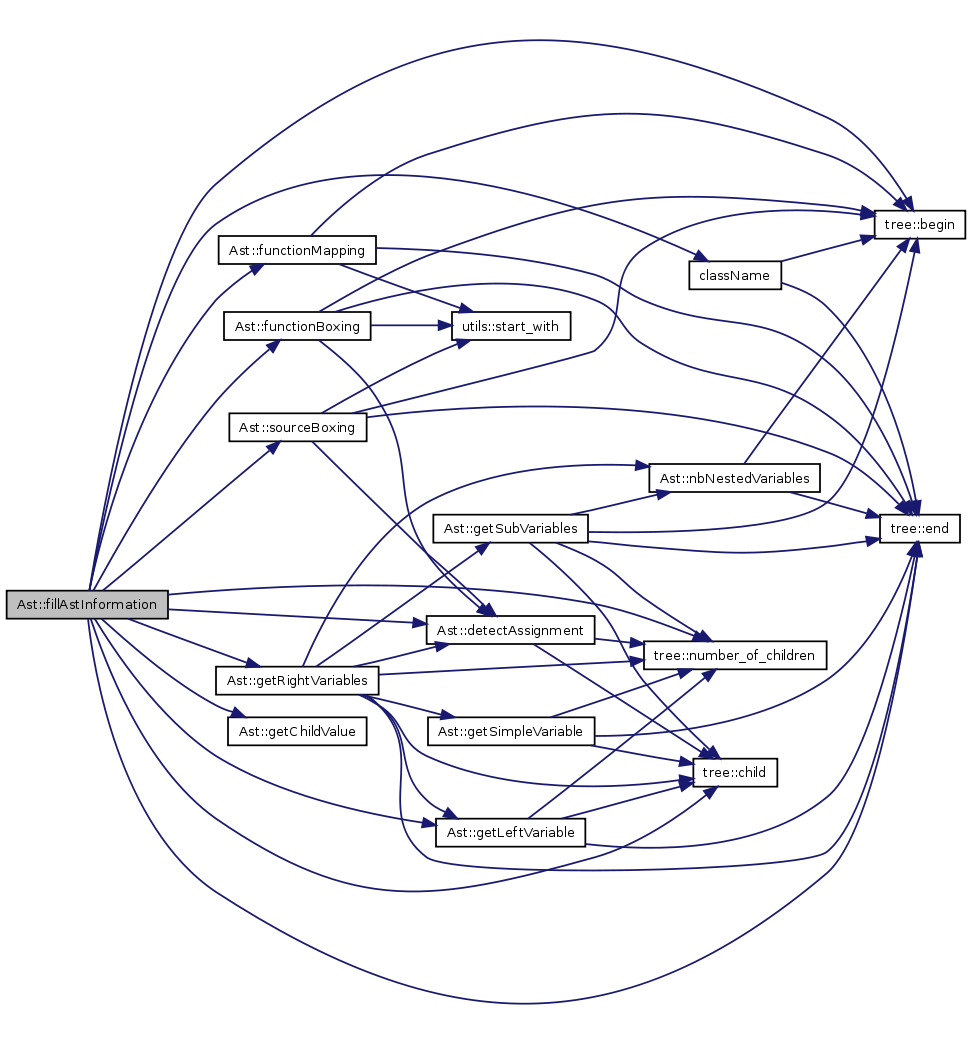

| void Ast::clearInfo | ( | ) | [protected] |
Clear all information.
Definition at line 848 of file AstContainer.cpp.
References classes, functions, and variables.
Referenced by convert().
00849 { 00850 classes = MapClasses(); 00851 variables = MapVariables(); 00852 functions = MapFunctions(); 00853 }

| std::string Ast::getChildValue | ( | tree< AstNode >::iterator | parent, | |
| const std::string & | nodeName = "T_STRING" | |||
| ) | const [protected] |
Going down one node, return the name of the value (may be function, class, variable, etc.).
Referenced by fillAstInformation().

Return the number of nested variables: the number of variable in the sub-tree.
Calculate the number of nested variables
Definition at line 105 of file AstContainer.cpp.
References tree< T, tree_node_allocator >::begin(), tree< T, tree_node_allocator >::end(), and tr.
Referenced by getRightVariables(), and getSubVariables().
00106 { 00107 unsigned nbVars = 0; 00108 tree<AstNode>::iterator lter = tr.begin(iter); 00109 for (;lter!=tr.end(iter);++lter) { 00110 if (lter->getType() == "T_VARIABLE") 00111 ++nbVars; 00112 } 00113 return nbVars; 00114 }


| void Ast::functionMapping | ( | const tree< AstNode >::iterator & | it, | |
| const std::string & | fctName | |||
| ) | [protected] |
Get all the function names used in a function or method.
Mapping one function to others. The other functions are all the function call in the function.
Definition at line 297 of file AstContainer.cpp.
References tree< T, tree_node_allocator >::begin(), tree< T, tree_node_allocator >::end(), fctmap, utils::start_with(), and tr.
Referenced by fillAstInformation().
00298 { 00299 if (fctmap.find(fctName) != fctmap.end()) 00300 return; 00301 else 00302 { 00303 list<string> related; 00304 for (tree<AstNode>::iterator iter = tr.begin(it); iter != tr.end(it); ++iter) { 00305 string t = iter->getType(); 00306 if (t == "function_call") { 00307 tree<AstNode>::iterator son = tr.begin(iter); 00308 if (son->getType() == "T_STRING") { 00309 tree<AstNode>::iterator textable = tr.begin(son); 00310 if (textable->getType() == "text") { 00311 related.push_back(textable->getValue()); 00312 } 00313 } 00314 } 00315 else if (t == "unticked_statement") { 00316 tree<AstNode>::iterator son = tr.begin(iter); 00317 if (utils::start_with(son->getType(), "T_")) { 00318 tree<AstNode>::iterator textable = tr.begin(son); 00319 if (textable->getType() == "text") { 00320 related.push_back(textable->getValue()); 00321 } 00322 } 00323 } 00324 } 00325 // Insert into the fctmap 00326 fctmap.insert(make_pair(fctName, related)); 00327 } 00328 }
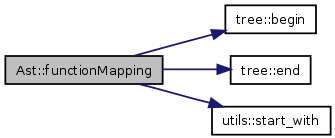

| void Ast::functionBoxing | ( | const tree< AstNode >::iterator & | it, | |
| const std::string & | fctName | |||
| ) | [protected] |
Box one function.
Boxing a function. Get inputs/outputs in term of functions.
Definition at line 217 of file AstContainer.cpp.
References tree< T, tree_node_allocator >::begin(), boxedFunction, detectAssignment(), tree< T, tree_node_allocator >::end(), BoxedFunction::input, BoxedFunction::output, utils::start_with(), and tr.
Referenced by fillAstInformation().
00218 { 00219 if (boxedFunction.find(fctName) != boxedFunction.end()) 00220 return; 00221 else 00222 { 00223 BoxedFunction bFct; 00224 // Get the input 00225 for (tree<AstNode>::iterator iter = tr.begin(it); iter != tr.end(it); ++iter) 00226 { 00227 if (detectAssignment(iter)) 00228 { 00229 // check if the right side has a function, if so, this is an input 00230 for (tree<AstNode>::iterator jter = tr.begin(iter); jter != tr.end(iter); ++jter) { 00231 string t = jter->getType(); 00232 if (t == "function_call") { 00233 tree<AstNode>::iterator son = tr.begin(jter); 00234 if (son->getType() == "T_STRING") { 00235 tree<AstNode>::iterator textable = tr.begin(son); 00236 if (textable->getType() == "text") { 00237 if (bFct.input.find(textable->getValue()) != bFct.input.end()) 00238 continue; 00239 //cout << "Add in the boxed input ( "<< fctName << " ): " << textable->getValue() << endl; 00240 bFct.input.insert(make_pair(textable->getValue(), jter)); 00241 } 00242 } 00243 } 00244 else if (t == "unticked_statement") { 00245 tree<AstNode>::iterator son = tr.begin(jter); 00246 if (utils::start_with(son->getType(), "T_")) { 00247 tree<AstNode>::iterator textable = tr.begin(son); 00248 if (textable->getType() == "text") { 00249 if (bFct.input.find(textable->getValue()) != bFct.input.end()) 00250 continue; 00251 //cout << "Add in the boxed input ( "<< fctName << " ): " << textable->getValue() << endl; 00252 bFct.input.insert(make_pair(textable->getValue(), jter)); 00253 } 00254 } 00255 } 00256 } 00257 } 00258 } 00259 // Second pass to get the isolated calls, getting the output 00260 for (tree<AstNode>::iterator iter = tr.begin(it); iter != tr.end(it); ++iter) 00261 { 00262 string t = iter->getType(); 00263 if (t == "function_call") { 00264 tree<AstNode>::iterator son = tr.begin(iter); 00265 if (son->getType() == "T_STRING") { 00266 tree<AstNode>::iterator textable = tr.begin(son); 00267 if (textable->getType() == "text") { 00268 if (bFct.output.find(textable->getValue()) != bFct.output.end()) 00269 continue; 00270 //cout << "Add in the boxed output ( "<< fctName << " ): " << textable->getValue() << endl; 00271 bFct.output.insert(make_pair(textable->getValue(), iter)); 00272 } 00273 } 00274 } 00275 else if (t == "unticked_statement") { 00276 tree<AstNode>::iterator son = tr.begin(iter); 00277 if (utils::start_with(son->getType(), "T_")) { 00278 tree<AstNode>::iterator textable = tr.begin(son); 00279 if (textable->getType() == "text") { 00280 if (bFct.output.find(textable->getValue()) != bFct.output.end()) 00281 continue; 00282 //cout << "Add in the boxed output ( "<< fctName << " ): " << textable->getValue() << endl; 00283 bFct.output.insert(make_pair(textable->getValue(), iter)); 00284 } 00285 } 00286 } 00287 } 00288 boxedFunction.insert(make_pair(fctName, bFct)); 00289 //cout << "box size = " << boxedFunction.size() << endl; 00290 } 00291 }


Source boxing.
Boxing a source code. Get inputs/outputs in term of functions.
Definition at line 138 of file AstContainer.cpp.
References tree< T, tree_node_allocator >::begin(), boxedSource, detectAssignment(), tree< T, tree_node_allocator >::end(), BoxedFunction::input, BoxedFunction::output, utils::start_with(), and tr.
Referenced by fillAstInformation().
00139 { 00140 // Get the input 00141 for (tree<AstNode>::iterator iter = tr.begin(it); iter != tr.end(it); ++iter) 00142 { 00143 // skip the functions 00144 if (iter->getType() == "unticked_function_declaration_statement") { 00145 iter = tr.end(iter); 00146 } 00147 else if (detectAssignment(iter)) 00148 { 00149 // check if the right side has a function, if so, this is an input 00150 for (tree<AstNode>::iterator jter = tr.begin(iter); jter != tr.end(iter); ++jter) { 00151 string t = jter->getType(); 00152 if (t == "function_call") { 00153 tree<AstNode>::iterator son = tr.begin(jter); 00154 if (son->getType() == "T_STRING") { 00155 tree<AstNode>::iterator textable = tr.begin(son); 00156 if (textable->getType() == "text") { 00157 if (boxedSource.input.find(textable->getValue()) != boxedSource.input.end()) 00158 continue; 00159 //cout << "Add in the boxed input ( "<< fctName << " ): " << textable->getValue() << endl; 00160 boxedSource.input.insert(make_pair(textable->getValue(), jter)); 00161 } 00162 } 00163 } 00164 else if (t == "unticked_statement") { 00165 tree<AstNode>::iterator son = tr.begin(jter); 00166 if (utils::start_with(son->getType(), "T_")) { 00167 tree<AstNode>::iterator textable = tr.begin(son); 00168 if (textable->getType() == "text") { 00169 if (boxedSource.input.find(textable->getValue()) != boxedSource.input.end()) 00170 continue; 00171 //cout << "Add in the boxed input ( "<< fctName << " ): " << textable->getValue() << endl; 00172 boxedSource.input.insert(make_pair(textable->getValue(), jter)); 00173 } 00174 } 00175 } 00176 } 00177 } 00178 } 00179 00180 // Second pass to get the isolated calls, getting the output 00181 for (tree<AstNode>::iterator iter = tr.begin(it); iter != tr.end(it); ++iter) 00182 { 00183 string t = iter->getType(); 00184 if (t == "unticked_function_declaration_statement") { 00185 iter = tr.end(iter); 00186 } 00187 else if (t == "function_call") { 00188 tree<AstNode>::iterator son = tr.begin(iter); 00189 if (son->getType() == "T_STRING") { 00190 tree<AstNode>::iterator textable = tr.begin(son); 00191 if (textable->getType() == "text") { 00192 if (boxedSource.output.find(textable->getValue()) != boxedSource.output.end()) 00193 continue; 00194 //cout << "Add in the boxed output ( "<< fctName << " ): " << textable->getValue() << endl; 00195 boxedSource.output.insert(make_pair(textable->getValue(), iter)); 00196 } 00197 } 00198 } 00199 else if (t == "unticked_statement") { 00200 tree<AstNode>::iterator son = tr.begin(iter); 00201 if (utils::start_with(son->getType(), "T_")) { 00202 tree<AstNode>::iterator textable = tr.begin(son); 00203 if (textable->getType() == "text") { 00204 if (boxedSource.output.find(textable->getValue()) != boxedSource.output.end()) 00205 continue; 00206 //cout << "Add in the boxed output ( "<< fctName << " ): " << textable->getValue() << endl; 00207 boxedSource.output.insert(make_pair(textable->getValue(), iter)); 00208 } 00209 } 00210 } 00211 } 00212 }


Detect if there is an assignment in the subtree.
Detect an assignment in the subtree
Definition at line 126 of file AstContainer.cpp.
References tree< T, tree_node_allocator >::child(), tree< T, tree_node_allocator >::number_of_children(), and tr.
Referenced by fillAstInformation(), functionBoxing(), getRightVariables(), and sourceBoxing().
00127 { 00128 if (tr.number_of_children(iter) == 3 && tr.child(iter, 1)->getType() == "CHAR61") 00129 return true; 00130 return false; 00131 }


Detect if there is a function declaration in the subtree.
Definition at line 760 of file AstContainer.cpp.
Referenced by trace().

| list< VarBase > Ast::getRightVariables | ( | const tree< AstNode >::iterator & | it, | |
| const VarBase & | left | |||
| ) | [protected] |
Must not be 'const' since it can write to the MapAssignements...
Get in post-order the right variables assignments
Definition at line 427 of file AstContainer.cpp.
References tree< T, tree_node_allocator >::child(), detectAssignment(), tree< T, tree_node_allocator >::end(), equivalences, getLeftVariable(), getSimpleVariable(), getSubVariables(), VarBase::name, nbNestedVariables(), tree< T, tree_node_allocator >::number_of_children(), and tr.
Referenced by fillAstInformation().
00428 { 00429 00430 list<VarBase> varBaseList; 00431 unsigned nestedVars = nbNestedVariables(it); 00432 if (nestedVars == 0) 00433 return varBaseList; 00434 else if (nestedVars == 1 && !detectAssignment(it)) { 00435 VarBase simple = getSimpleVariable(it); 00436 varBaseList.push_back(simple); 00437 return varBaseList; 00438 } 00439 else 00440 { 00441 // Go to the last right 'expr_without_variable' 00442 unsigned nbchilds = tr.number_of_children(it); 00443 tree<AstNode>::iterator iter = tr.child(it, nbchilds - 1); 00444 // 00445 if (detectAssignment(iter)) { 00446 // Assignment => Let's move to the right, and grab the left variable as a 'left variable' 00447 VarBase leftVar = getLeftVariable(tr.child(iter, 0)); 00448 if (leftVar.name != "") 00449 varBaseList.push_back(leftVar); 00450 list<VarBase> rightVars = getRightVariables(tr.child(iter, 2), left); 00451 // merge the result 00452 for (list<VarBase>::const_iterator jt=rightVars.begin(); jt!=rightVars.end();++jt) 00453 varBaseList.push_back(*jt); 00454 } 00455 else { 00456 AstVarBaseList locVarList; 00457 // get all variables, put that in a equivalences 00458 for (tree<AstNode>::iterator jter = iter;jter != tr.end(iter); ++jter) { 00459 string type(jter->getType()); 00460 if (type == "reference_variable") 00461 { 00462 unsigned nbchilds = tr.number_of_children(jter); 00463 if (nbchilds == 1) { 00464 if (tr.child(jter, 0)->getType() == "compound_variable") { 00465 // single variables 00466 tree<AstNode>::iterator var = jter; 00467 for(;var->getType() != "text"; ++var) 00468 ; 00469 //cerr << "I got this? " << var->getValue() << endl; 00470 VarBase right(var->getValue(), it); 00471 if (!(find(locVarList.begin(), locVarList.end(),right) != locVarList.end())) 00472 locVarList.push_back(right); 00473 jter = var; 00474 } 00475 } 00476 else if (nbchilds == 4) { 00477 // array ? 00478 tree<AstNode>::iterator array = tr.child(jter, 0); 00479 tree<AstNode>::iterator index = tr.child(jter, 2); 00480 for(;array->getType() != "text" && array != tr.end(); ++array) 00481 ; 00482 for(;index->getType() != "text" && index != tr.end(); ++index) 00483 ; 00484 VarBase right(array->getValue(), it, index->getValue()); 00485 if (!(find(locVarList.begin(), locVarList.end(),right) != locVarList.end())) 00486 locVarList.push_back(right); 00487 jter = index; 00488 } 00489 } 00490 else if (type == "expr_without_variable") 00491 { 00492 //cerr << "expr_wo_var "; 00493 unsigned nbchilds = tr.number_of_children(iter); 00494 //cerr << nbchilds << endl; 00495 for (unsigned c=0;c<nbchilds;++c) 00496 { 00497 list<VarBase> varBaseListTemp = getSubVariables(tr.child(iter, c)); 00498 if (varBaseListTemp.size() > 0) { 00499 // merge the list 00500 for (list<VarBase>::const_iterator jter=varBaseListTemp.begin();jter!=varBaseListTemp.end();++jter) { 00501 if (find(locVarList.begin(),locVarList.end(),*jter) == locVarList.end()) 00502 locVarList.push_back(*jter); 00503 } 00504 } 00505 } 00506 00507 /* 00508 // go to the T_VARIABLE 00509 tree<AstNode>::iterator var = jter; 00510 for(;var->getType() != "T_VARIABLE"; ++var) 00511 ; 00512 var = tr.child(var, 0); 00513 //cerr << "I got this? " << var->getValue() << endl; 00514 VarBase right(var->getValue(), it); 00515 if (!(find(locVarList.begin(), locVarList.end(),right) != locVarList.end())) 00516 locVarList.push_back(right); 00517 */ 00518 } 00519 } 00520 // local equivalences 00521 equivalences.insert(make_pair(left, locVarList)); 00522 } 00523 return varBaseList; 00524 } 00525 }


Get the variable in the left of an assignment.
Get left variable name
Definition at line 576 of file AstContainer.cpp.
References tree< T, tree_node_allocator >::child(), tree< T, tree_node_allocator >::end(), tree< T, tree_node_allocator >::number_of_children(), and tr.
Referenced by fillAstInformation(), and getRightVariables().
00577 { 00578 tree<AstNode>::iterator it = iter; 00579 for (;it->getType() != "reference_variable"; ++it) 00580 ; 00581 unsigned nbchilds = tr.number_of_children(it); 00582 if (nbchilds == 1) { 00583 tree<AstNode>::iterator var = it; 00584 for(;var->getType() != "text"; ++var) 00585 ; 00586 return VarBase(var->getValue(), it); 00587 } 00588 else if (nbchilds == 4) { 00589 // $foo['var'] pattern detected! 00590 tree<AstNode>::iterator array = tr.child(it, 0); 00591 tree<AstNode>::iterator index = tr.child(it, 2); 00592 for(;array->getType() != "text" && array != tr.end(); ++array) 00593 ; 00594 for(;index->getType() != "text" && index != tr.end(); ++index) 00595 ; 00596 return VarBase(array->getValue(), it, index->getValue()); 00597 } 00598 else { 00599 // Not supported 00600 cerr << "getLeftVariable, unsupported elemnts nb = " << *it << endl; 00601 return VarBase(); 00602 } 00603 return VarBase(); 00604 }
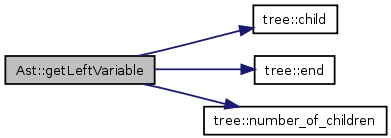

Simply get the one variable with is on the subtree.
Get a simple variable name; we know that there is one expression with one variable inside. We need to get this!
Definition at line 531 of file AstContainer.cpp.
References tree< T, tree_node_allocator >::child(), tree< T, tree_node_allocator >::end(), tree< T, tree_node_allocator >::number_of_children(), and tr.
Referenced by getRightVariables().
00532 { 00533 tree<AstNode>::iterator iter = it; 00534 // go the the variable 00535 for (;iter != tr.end(it); ++iter) { 00536 if (iter->getType() == "reference_variable") 00537 { 00538 unsigned nbchilds = tr.number_of_children(iter); 00539 if (nbchilds == 1) { 00540 if (tr.child(iter, 0)->getType() == "compound_variable") { 00541 // single variables 00542 tree<AstNode>::iterator var = iter; 00543 for(;var->getType() != "text"; ++var) 00544 ; 00545 return VarBase(var->getValue(), it); 00546 } 00547 } 00548 else if (nbchilds == 4) { 00549 // array ? 00550 tree<AstNode>::iterator array = tr.child(iter, 0); 00551 tree<AstNode>::iterator index = tr.child(iter, 2); 00552 for(;array->getType() != "text" && array != tr.end(); ++array) 00553 ; 00554 for(;index->getType() != "text" && index != tr.end(); ++index) 00555 ; 00556 return VarBase(array->getValue(), it, index->getValue()); 00557 } 00558 } 00559 else if (iter->getType() == "expr_without_variable") 00560 { 00561 // go to the T_VARIABLE 00562 tree<AstNode>::iterator var = iter; 00563 for(;var->getType() != "T_VARIABLE"; ++var) 00564 ; 00565 var = tr.child(var, 0); 00566 return VarBase (var->getValue(), it); 00567 } 00568 } 00569 // backtrack for: strings, functions, class 00570 return VarBase(); 00571 }
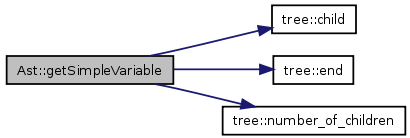

Get the list of all subvariable.
Get in post-order all the variables
Definition at line 334 of file AstContainer.cpp.
References tree< T, tree_node_allocator >::begin(), tree< T, tree_node_allocator >::child(), tree< T, tree_node_allocator >::end(), nbNestedVariables(), tree< T, tree_node_allocator >::number_of_children(), and tr.
Referenced by getRightVariables(), and NumberSunkDiffuseInputs::operator()().
00335 { 00336 list<VarBase> varBaseList; 00337 if (nbNestedVariables(it) < 1) 00338 return varBaseList; 00339 //cerr << "start:- getSubVars" << endl; 00340 string type; 00341 for (tree<AstNode>::iterator iter=tr.begin(it);iter!=tr.end(it) && iter!=tr.end();iter++) 00342 { 00343 type = iter->getType(); 00344 //cout << "\t\t\t => type = " << type << endl; 00345 if (type == "reference_variable") 00346 { 00347 //cerr << "\tref_var "; 00348 unsigned nbchilds = tr.number_of_children(iter); 00349 //cerr << nbchilds << endl; 00350 if (nbchilds == 1) { 00351 //cout << '[' << iter->getType() << " -> " << tr.child(iter,0)->getType() << ']' << endl; 00352 00353 if (tr.child(iter, 0)->getType() == "compound_variable") { 00354 // single variables 00355 tree<AstNode>::iterator var = iter; 00356 for(;var->getType() != "text" && var != tr.end(it); ++var) 00357 ; 00358 //cerr << setw(15) << "ref :- [" << var->getValue() << ',' << it; 00359 varBaseList.push_back(VarBase(var->getValue(), it)); 00360 //cerr << " ]" << endl; 00361 iter = var; 00362 } 00363 } 00364 else if (nbchilds == 4) { 00365 // array ? 00366 tree<AstNode>::iterator array = tr.child(iter, 0); 00367 tree<AstNode>::iterator index = tr.child(iter, 2); 00368 for(;array->getType() != "text" && array != tr.end(it); ++array) 00369 ; 00370 for(;index->getType() != "text" && index != tr.end(it); ++index) 00371 ; 00372 //cerr << setw(15) << "array:- [" << array->getValue() << ',' << it << ',' << index->getValue(); 00373 varBaseList.push_back(VarBase(array->getValue(), it, index->getValue())); 00374 //cerr << " ]" << endl; 00375 iter = index; 00376 } 00377 } 00378 else if (type == "expr_without_variable" || type == "encaps_var") 00379 { 00380 //cerr << "\texpr_wo_var "; 00381 unsigned nbchilds = tr.number_of_children(iter); 00382 //cerr << nbchilds << endl; 00383 for (unsigned c=0;c<nbchilds;++c) 00384 { 00385 list<VarBase> varBaseListTemp = getSubVariables(tr.child(iter, c)); 00386 if (varBaseListTemp.size() > 0) { 00387 // merge the list 00388 for (list<VarBase>::const_iterator jter=varBaseListTemp.begin();jter!=varBaseListTemp.end();++jter) { 00389 if (find(varBaseList.begin(),varBaseList.end(),*jter) == varBaseList.end()) { 00390 //cout << *jter << endl; 00391 varBaseList.push_back(*jter); 00392 } 00393 } 00394 } 00395 } 00396 /* 00397 // go to the T_VARIABLE 00398 tree<AstNode>::iterator var = iter; 00399 for(;var->getType() != "T_VARIABLE" && var != tr.end(it) && var != tr.end(); ++var) 00400 ; 00401 var = tr.child(var, 0); 00402 cerr << setw(15) << "expr:- [" << var->getValue() << ',' << it; 00403 varBaseList.push_back(VarBase(var->getValue(), it)); 00404 cerr << " ]" << endl; 00405 //iter = var; 00406 */ 00407 } 00408 else if (type == "T_VARIABLE") 00409 { 00410 //cout << "TVariable" << endl; 00411 tree<AstNode>::iterator var = iter; 00412 for(;var->getType() != "text" && var != tr.end(it); ++var) 00413 ; 00414 //cerr << setw(15) << "ref :- [" << var->getValue() << ',' << it; 00415 varBaseList.push_back(VarBase(var->getValue(), it)); 00416 //cerr << " ]" << endl; 00417 iter = var; 00418 } 00419 } 00420 //cerr << "end:- getSubVars" << endl; 00421 return varBaseList; 00422 }
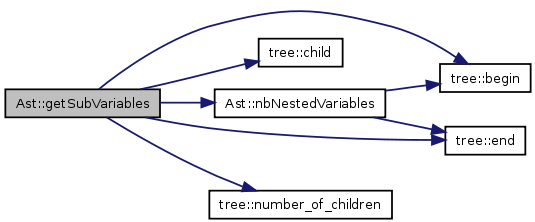

Definition at line 202 of file AstContainer.h.
References assign, classes, equivalences, functions, ref, root, tr, and variables.
00202 { 00203 if (this != &ast) { 00204 tr = ast.tr; 00205 root = ast.root; 00206 functions = ast.functions; 00207 variables = ast.variables; 00208 classes = ast.classes; 00209 equivalences = ast.equivalences; 00210 assign = ast.assign; 00211 ref = ast.ref; 00212 } 00213 return *this; 00214 }
Definition at line 217 of file AstContainer.h.
References tr.
Referenced by applyModification().
00217 { return (&tr); }

Definition at line 218 of file AstContainer.h.
References tr.
Referenced by ControlFlow::operator()(), NumberSunkDiffuseInputs::operator()(), NumberDiffuseInputs::operator()(), and NumberInput::operator()().
00218 { return (const tree<AstNode>*)(&tr); }
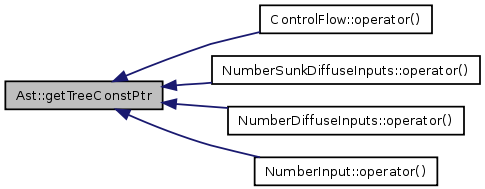
| std::map<std::string, BoxedFunction> Ast::getBoxedFunctions | ( | ) | const [inline] |
Definition at line 220 of file AstContainer.h.
References boxedFunction.
Referenced by NumberSunkDiffuseInputs::operator()(), NumberResources::operator()(), and NumberSinks::operator()().
00220 { 00221 return boxedFunction; 00222 }

| FunctionMapping Ast::getMappedFunctions | ( | ) | const [inline] |
Definition at line 223 of file AstContainer.h.
References fctmap.
00223 { 00224 return fctmap; 00225 }
| std::list<std::string> Ast::getVariableNames | ( | ) | const [inline] |
Get names informations.
Definition at line 227 of file AstContainer.h.
References variables.
00227 { 00228 // extract the keys of the map 'variables' 00229 std::list<std::string> ret; 00230 for(MapVariables::const_iterator iter = variables.begin(); iter != variables.end(); ++iter) 00231 ret.push_back(iter->first); 00232 return ret; 00233 }
| std::list<std::string> Ast::getFunctionNames | ( | ) | const [inline] |
Definition at line 234 of file AstContainer.h.
References functions.
00234 { 00235 std::list<std::string> ret; 00236 for(MapFunctions::const_iterator iter = functions.begin(); iter != functions.end(); ++iter) 00237 ret.push_back(iter->first); 00238 return ret; 00239 }
| std::list<std::string> Ast::getClassNames | ( | ) | const [inline] |
Definition at line 240 of file AstContainer.h.
References classes.
00240 { 00241 std::list<std::string> ret; 00242 for(MapClasses::const_iterator iter = classes.begin(); iter != classes.end(); ++iter) 00243 ret.push_back(iter->first); 00244 return ret; 00245 }
| Ast Ast::skeleton | ( | ) | const |
Definition at line 803 of file AstContainer.cpp.
References tree< T, tree_node_allocator >::begin(), tree< T, tree_node_allocator >::end(), is_skeleton_node(), tree< T, tree_node_allocator >::parent(), ref, tree< T, tree_node_allocator >::reparent(), and tr.
00804 { 00805 Ast temp(*this); 00806 temp.ref = const_cast<Ast *>(this); 00807 for (tree<AstNode>::iterator iter=temp.tr.begin(); iter!=temp.tr.end();++iter) 00808 { 00809 if (!temp.is_skeleton_node(iter)) { 00810 // just delete it with reparent 00811 temp.tr.reparent(temp.tr.parent(iter), iter); 00812 } 00813 } 00814 return temp; 00815 }
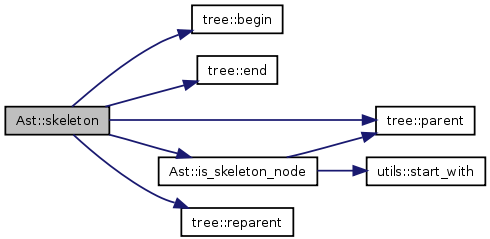
| void Ast::trace | ( | const std::string & | varName | ) | const |
Definition at line 767 of file AstContainer.cpp.
References assign, tree< T, tree_node_allocator >::begin(), detectFunction(), tree< T, tree_node_allocator >::parent(), print_current_list(), tr, and variables.
00768 { 00769 // Find that variables 00770 AstVarBaseList obsVars, totalVars; 00771 MapVariables::const_iterator pos=variables.find(varName); 00772 if (pos != variables.end()) 00773 obsVars = pos->second; 00774 // check with the assignments to see whether we should look for other variables 00775 totalVars = obsVars; 00776 for (MapAssignments::const_iterator iter=assign.begin();iter!=assign.end();++iter) 00777 { 00778 for (AstVarBaseList::iterator jter=totalVars.begin();jter!=totalVars.end();++jter) 00779 { 00780 //cerr << "What about?" << iter->second << " , " << *jter << endl; 00781 if (iter->second.name == jter->name) { 00782 if (find(totalVars.begin(), totalVars.end(), iter->first) == totalVars.end()) 00783 totalVars.push_back(iter->first); 00784 } 00785 } 00786 } 00787 print_current_list(totalVars); 00788 // For each variable in the domain, look for the functions, calls etc. 00789 for (AstVarBaseList::iterator iter=totalVars.begin(); iter!=totalVars.end();++iter) { 00790 cerr << *iter << endl; 00791 // take this variable and rewind it! 00792 tree<AstNode>::iterator nter = iter->position; 00793 do { 00794 nter = tr.parent(nter); 00795 // Check for functions 00796 if (detectFunction(nter)) { 00797 cerr << nter << endl; 00798 } 00799 } while (nter != tr.begin()); 00800 } 00801 }
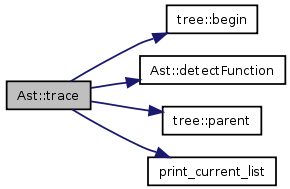
| void Ast::apply | ( | Obfuscator * | obs | ) |
| StringBuffer Ast::convert | ( | Translation * | obs | ) |
Definition at line 70 of file AstContainer.cpp.
References assign, classes, clearInfo(), equivalences, fillAstInformation(), functions, tr, and variables.
Referenced by main().
00070 { 00071 clearInfo(); 00072 fillAstInformation(); 00073 return obs->operator()(tr, &classes, &variables, &functions, &assign, &equivalences); 00074 }
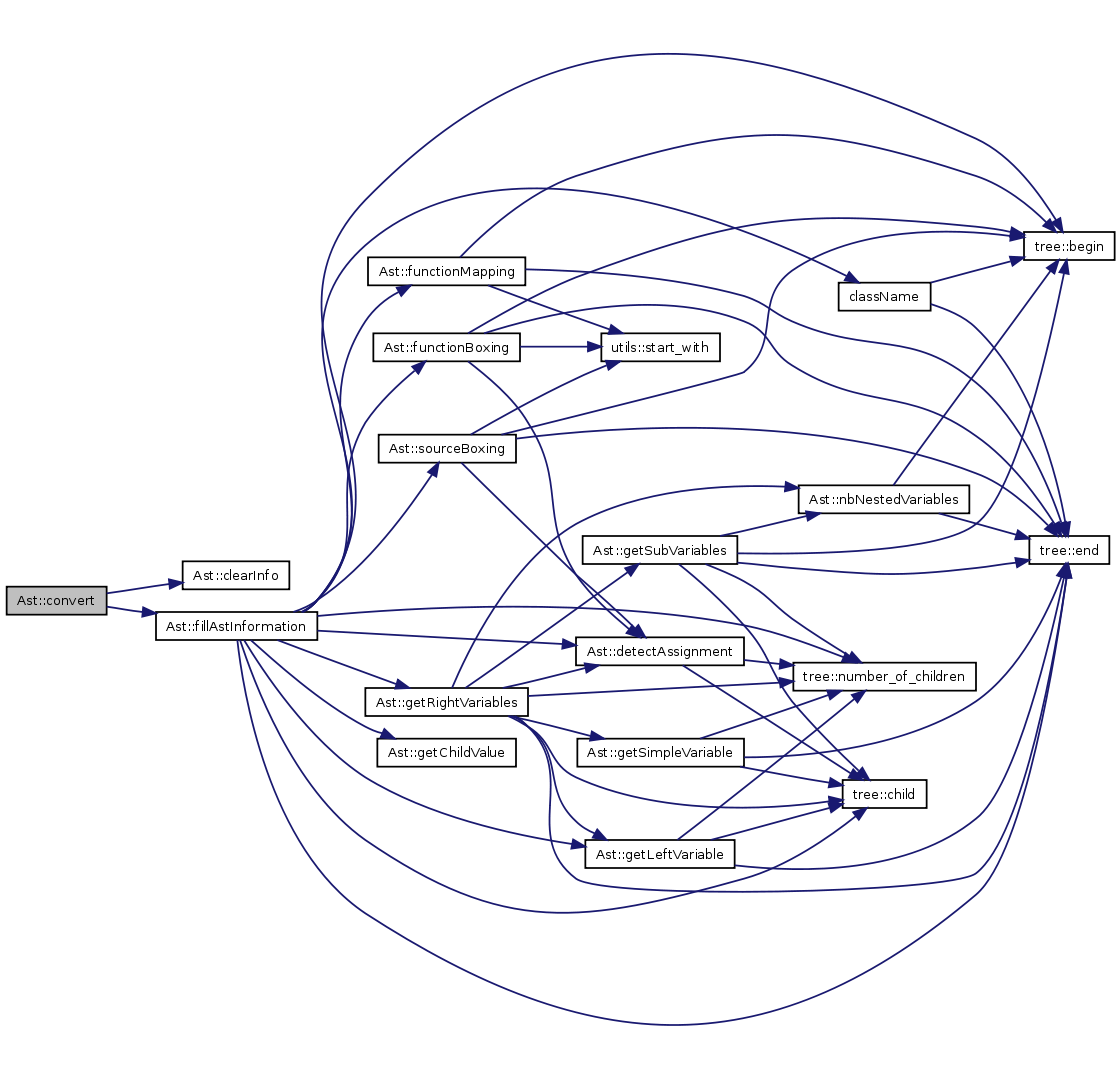

| MetricResult Ast::compute | ( | Metric * | metric | ) | const |
Definition at line 77 of file AstContainer.cpp.
References assign, classes, equivalences, functions, tr, and variables.
Referenced by computeMetrics().
00078 { 00079 return metric->operator()(tr, &classes, &variables, &functions, &assign, &equivalences); 00080 }

| void Ast::printInfo | ( | std::ostream & | stream | ) | const |
| std::ostream& operator<< | ( | std::ostream & | stream, | |
| const Ast & | ast | |||
| ) | [friend] |
| void exportXML | ( | const Ast & | ast, | |
| const std::string & | xmlName | |||
| ) | [friend] |
Store the tree.
Definition at line 124 of file AstContainer.h.
Referenced by apply(), compute(), convert(), detectAssignment(), exportXML(), fillAstInformation(), functionBoxing(), functionMapping(), getLeftVariable(), getRightVariables(), getSimpleVariable(), getSubVariables(), getTreeConstPtr(), getTreePtr(), is_skeleton_node(), nbNestedVariables(), operator<<(), operator=(), skeleton(), sourceBoxing(), trace(), and walk().
Iterator to the root of the tree.
Definition at line 126 of file AstContainer.h.
Referenced by operator=().
MapFunctions Ast::functions [protected] |
Function name to tree iterator.
Definition at line 128 of file AstContainer.h.
Referenced by apply(), clearInfo(), compute(), convert(), fillAstInformation(), getFunctionNames(), and operator=().
MapVariables Ast::variables [protected] |
Variable name to list of variable (VarBase) which depends on the context of the variable.
Definition at line 130 of file AstContainer.h.
Referenced by apply(), clearInfo(), compute(), convert(), fillAstInformation(), getVariableNames(), operator=(), and trace().
MapClasses Ast::classes [protected] |
Class name to tree iterator.
Definition at line 132 of file AstContainer.h.
Referenced by apply(), clearInfo(), compute(), convert(), fillAstInformation(), getClassNames(), and operator=().
MapAssignments Ast::assign [protected] |
Relations within variables (contexted).
Definition at line 134 of file AstContainer.h.
Referenced by compute(), convert(), fillAstInformation(), operator=(), and trace().
MapVarEquivalent Ast::equivalences [protected] |
For the assignments, I need an equivalence between some variables $a = foo($b,$c,$d) with foo as a black box then, the variables b,c,d are equivalent given that $a variable
Definition at line 137 of file AstContainer.h.
Referenced by compute(), convert(), fillAstInformation(), getRightVariables(), and operator=().
std::map<std::string, BoxedFunction> Ast::boxedFunction [protected] |
For one function, list of what function is used as input and what is used as output.
Definition at line 139 of file AstContainer.h.
Referenced by functionBoxing(), and getBoxedFunctions().
FunctionMapping Ast::fctmap [protected] |
Function to list of function used in.
Definition at line 141 of file AstContainer.h.
Referenced by functionMapping(), and getMappedFunctions().
Reference to another tree, used for in-skeleton transformation.
Definition at line 143 of file AstContainer.h.
Referenced by Ast(), operator=(), and skeleton().
BoxedFunction Ast::boxedSource [protected] |
Do a boxing of the current source code, this is helpful for non function based code (php,asp, etc.).
Definition at line 145 of file AstContainer.h.
Referenced by sourceBoxing().
 1.5.3
1.5.3